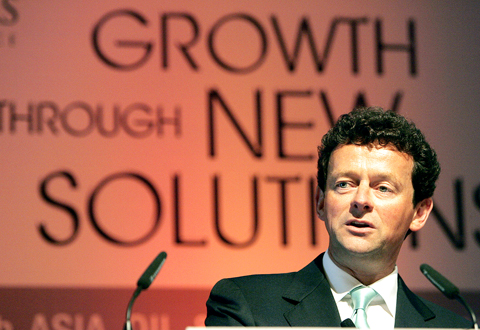Governments should lower trade barriers and cut taxes for the oil and gas industry to boost production and help stabilize global oil prices, the chief of oil giant BP PLC said yesterday.
Tony Hayward, chief executive of Europe’s second-largest oil producer, said the world is not short of oil and gas resources but that high operating costs, rising taxes and lack of access are hampering investment in new production capacity.
The inadequate supply to meet rising demand has led global oil prices to reach records, he said.

PHOTO: AP
“The problem is not below ground; the problem is above ground,” Hayward told a two-day oil and gas conference in Kuala Lumpur.
“The taxes that governments take from the oil and gas industry have continued to increase across the world. I believe this is unsustainable and counterproductive. All it means is that we have less money to invest in new production,” he said.
“Governments must also cooperate to lower trade barriers and tariffs,” he said.
“These are unproductive and run counter to the essential truth that a free and open energy market is just about the best possible guarantee to energy security,” he said.
He criticized government use of subsidies to shield consumers from rising oil prices, saying it was unsustainable as it strained public finances and discouraged sensible fuel efficiency measures.
Crude futures made their biggest single-day leap ever on Friday, soaring nearly US$11 for the day to US$138.54 a barrel but retreated below US$138 in Asian trading yesterday.
Some analysts have predicted that prices could keep climbing amid strong demand in Asia and tight supplies in the Western Hemisphere.
Hayward said there were still 42 years of proven oil reserves and 60 years of natural gas left and vast quantities of other unproven resources and unconventional hydrocarbons such as heavy oil and oil sands.
“We need to invest in new technology, to invest in capability and in alternative energy ... the key to new investment is to make the market work by getting the conditions right,” he said.
The International Energy Agency estimates that investments of US$22 trillion are needed between now and 2030 to meet future energy demand, Hayward said.
BP has raised its capital spending this year to US$22 billion, up nearly 15 percent from last year, to boost production, upgrade its refineries and investing in alternative forms of energy, he said.
Hayward called for increase partnership between private oil companies and national oil firms, which hold 80 percent of world resources.
Hassan Marican, chief executive of Malaysian national oil company Petronas, also urged governments to gradually remove fuel subsidies.
He said the subsidies had caused “unmitigated consumption and market distortions that are unmanageable in the long run.”
Malaysia and India last week became the two latest Asian nations to cut fuel subsidies, sparking protests nationwide as pump prices of gasoline and diesel rose sharply and inflation set to soar.

The CIA has a message for Chinese government officials worried about their place in Chinese President Xi Jinping’s (習近平) government: Come work with us. The agency released two Mandarin-language videos on social media on Thursday inviting disgruntled officials to contact the CIA. The recruitment videos posted on YouTube and X racked up more than 5 million views combined in their first day. The outreach comes as CIA Director John Ratcliffe has vowed to boost the agency’s use of intelligence from human sources and its focus on China, which has recently targeted US officials with its own espionage operations. The videos are “aimed at

STEADFAST FRIEND: The bills encourage increased Taiwan-US engagement and address China’s distortion of UN Resolution 2758 to isolate Taiwan internationally The Presidential Office yesterday thanked the US House of Representatives for unanimously passing two Taiwan-related bills highlighting its solid support for Taiwan’s democracy and global participation, and for deepening bilateral relations. One of the bills, the Taiwan Assurance Implementation Act, requires the US Department of State to periodically review its guidelines for engagement with Taiwan, and report to the US Congress on the guidelines and plans to lift self-imposed limitations on US-Taiwan engagement. The other bill is the Taiwan International Solidarity Act, which clarifies that UN Resolution 2758 does not address the issue of the representation of Taiwan or its people in

US Indo-Pacific Commander Admiral Samuel Paparo on Friday expressed concern over the rate at which China is diversifying its military exercises, the Financial Times (FT) reported on Saturday. “The rates of change on the depth and breadth of their exercises is the one non-linear effect that I’ve seen in the last year that wakes me up at night or keeps me up at night,” Paparo was quoted by FT as saying while attending the annual Sedona Forum at the McCain Institute in Arizona. Paparo also expressed concern over the speed with which China was expanding its military. While the US

SHIFT: Taiwan’s better-than-expected first-quarter GDP and signs of weakness in the US have driven global capital back to emerging markets, the central bank head said The central bank yesterday blamed market speculation for the steep rise in the local currency, and urged exporters and financial institutions to stay calm and stop panic sell-offs to avoid hurting their own profitability. The nation’s top monetary policymaker said that it would step in, if necessary, to maintain order and stability in the foreign exchange market. The remarks came as the NT dollar yesterday closed up NT$0.919 to NT$30.145 against the US dollar in Taipei trading, after rising as high as NT$29.59 in intraday trading. The local currency has surged 5.85 percent against the greenback over the past two sessions, central